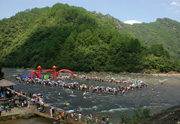Fujian takes lead in protecting food safety
( Xinhua )
Updated: 2014-11-14
FUZHOU - Blue notes beside the vegetable in a branch of Yonghui Supermarket in Fuzhou City, Fujian Province, show farm produce free of pesticide residue.
"The notice is helpful so that I can choose healthier food," said a customer surnamed Lin, one of the city's safety-minded shoppers.
"For ten years, we have been cooperating with local farmers to supervise the production of green food from the source," said vice chairman of the supermarket Weng Haihui.
The store has been monitoring the soil and water and regulating suppliers' pesticide use, he said.
The southeastern province of Fujian has been playing a leading role in China's food safety campaign. Since 2001, the provincial government has made food safety a priority, according to Zhong Anping, former director of the Fujian food safety office.
He said Fujian has formed food safety committees at the provincial, municipal and county levels, and the province has established a food safety supervision system covering areas such as production, processing, market circulation, standard certification, quality inspection, legal protection, and social supervision.
Spot checks during the first half of this year showed that 97.4 percent of the province's vegetables met the standard on pesticide residue, Zhong said. Additionally, 100 percent of live pigs passed a urine test to detect the additive ractopamine, and 97.4 percent of processed foods and 99 percent of aquatic products have met safety standards, Zhong added.
"Improvement in methods to prevent farmers from feeding pigs ractopamine is an example of the government's growing effectiveness in supervision," he said.
Ractopamine, or "lean meat powder," is a controversial feed additive used to promote lean meat growth in livestock.
"In the past, inspectors would set a 45-degree slope at the gates of slaughterhouses, and the pigs were driven to climb the slope. Those who failed to climb the slope were seen as having been fed with the additive. However, those results could not be that accurate," he said.
In recent years, the government has increased investment in equipment and reagents for the ractopamine urine test, and it has set up an online platform for information on the slaughter and sale of pigs, said Zhong.
Zheng Shengzhuan, an official with the health bureau of Xiamen City in Fujian, said all vegetables, aquatic and meat products in the city have to pass inspections for certification before entering markets.
LONG-TERM TASKH At midnight, lights were still on at the Xiamen Xiashang agricultural products wholesale market. Inspector Zheng Bo was busy categorizing the vegetables to be tested.
"About 800 baskets of vegetables will be tested tonight," he said, while squeezing a vegetable leaf to let its juice drop onto a piece of test paper.
"We can see the results within 15 minutes. If the harmful substances exceed the standard, the vegetables will be sent to quarantine stations to undergo tests by precision instruments. Should they fail the tests again, they will be disposed of instantly," he said.
China's food safety has been draped in doubt since a slew of high-profile food scandals shook the confidence of consumers. Particularly troubling was one in 2008, when melamine-tainted baby formula caused the deaths of at least six infants and made 300,000 ill.
Jia Ke, head of Fujian Food and Drug Administration, said that although the province has seen significant progress in curbing the food safety crisis, there are still regulatory gaps since related laws and regulations have yet to be completed.
Ensuring food safety is a long-term task that requires continuous government efforts, he said.






